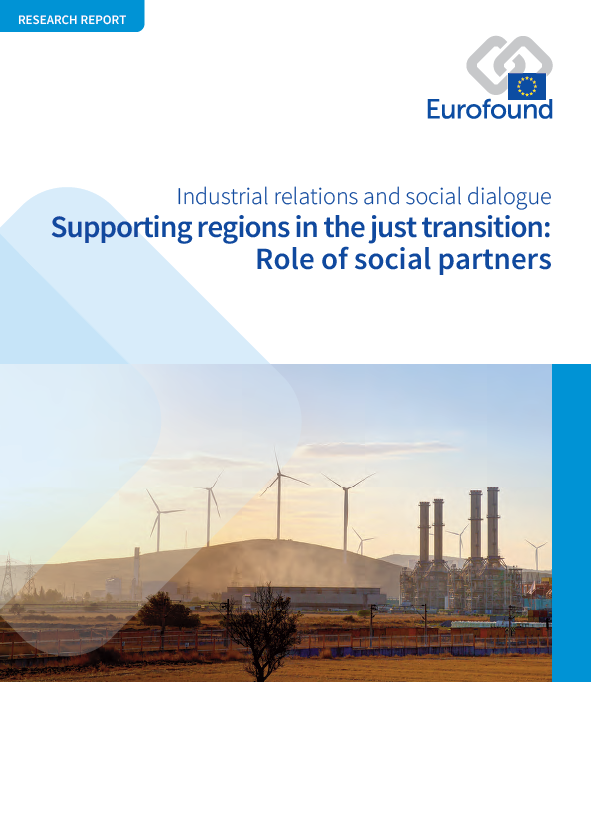
This report investigates the involvement of social partners in the just transition to a climate-neutral economy, with a particular focus on the territorial just transition plans. These plans aim to support the regions most negatively affected by the just transition by assisting workers to retrain, relocate and find other jobs, and also support industries that need to phase out fossil fuels or other greenhouse gas-intensive activities. The role and input of the social partners in these plans and their views on the just transition are explored. An analysis of social dialogue practices and examples of collective agreements shows the range of topics covered by the social partners. The report also investigates the role of the energy crisis in the just transition and how it has contributed to delays in the implementation of territorial just transition plans in certain Member States.
Key findings
In the EU, regions that are carbon intensive or where most of employment depends on fossil fuels are more affected by the transition to climate neutrality. Territorial just transition plans have been designed to protect these vulnerable regions by addressing the socioeconomic and environmental challenges brought by the green transition. Social partners are among the many actors contributing to shaping these regional plans.
At regional level, representatives of trade unions and employer organisations participate less in the design phase of the territorial just transition plans as countries tend to put more emphasis on consultation with peak-level and sectoral organisations. Considering that these plans mainly impact regions, it will be critical to promote the wider participation of social partners at regional level in the governance structure of the plans.
Social partners across Member States have provided vital input to the territorial just transition plans, focusing primarily on employment, including availability of jobs for displaced workers, mobility, job quality, investments in reskilling and upskilling, and regional development issues, such as subsidies and support for businesses, investments in digitalisation and creating a circular economy. While social partners in some countries indicated that their positions were taken on board, others were not entirely clear and, in a few countries, social partners felt that their proposals were not seriously considered.
Social dialogue and collective bargaining on just transition topics have taken place in some Member States but are not widespread. Sectoral collective agreements that include just transition elements were identified in only five Member States and the majority of the identified collective agreements were agreed at company level, with some concluded at cross-sectoral level. The topics covered by collective agreements at sectoral and cross-sectoral levels focus mainly on the reskilling and upskilling of workers and the monitoring of changes triggered by the digital and green transitions. Company level collective agreements also include social clauses that focus on restructuring processes linked to the green transition.
Overall, social partners are supportive of the EU’s climate neutrality objectives and have an essential role to play in partnerships for the transformation of regions and the just transition. However, findings show that some social partners, particularly in countries where social dialogue structures are rather weak, lack the capacity to meaningfully engage in the policy process, highlighting the importance of capacity building in dealing with the just transition.
The report contains the following lists of tables and figures.
List of tables
- Table 1: Countries with provisions for the involvement of social partners in the governance structures of TJTPs, 2022
- Table 2: Social partner organisations and institutions involved in TJTPs
- Table 3: The effect of the energy crisis on national TJTPs, 2022
List of figures
- Figure 1: Just Transition Mechanism and Territorial Just Transition Plans
- Figure 2: Forums and opportunities for social partners’ involvement in the design phase of TJTPs, EU Member States, 2022
- Number of pages
-
46
- Reference nº
-
EF23020EN
- ISBN
-
978-92-897-2336-7
- Catalogue nº
-
TJ-05-23-234-EN-N
- DOI
-
10.2806/830912
- Permalink
Cite this publication
Eurofound (2023), Supporting regions in the just transition: Role of social partners, Publications Office of the European Union, Luxembourg.